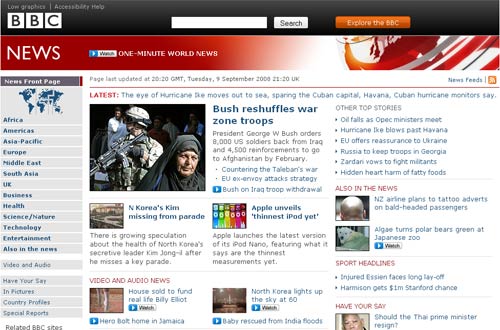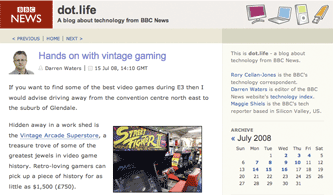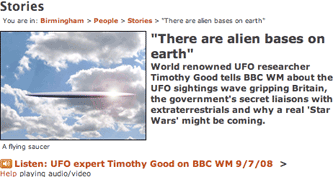Social media and www.bbc.co.uk
Yesterday I wrote about the disappointing performance of the UK's terrestrial broadcasters on social media sites. During the course of my recent month long study, aside from the BBC, I only spotted one URL from Channel 4 become popular. There was no content at all from ITV or Five.



However, the BBC figure is, of course, distorted by the inclusion of BBC News stories in the figure of 341 popular social media URLs. Indeed, if I excluded content that was served on the news.bbc.co.uk domain, I found that only 5 items from the rest of the BBC were popular.

BBC Monitoring on Newsvine
These 5 popular social media links included a sample story from the BBC Monitoring service on Newsvine. Hosted on the www.monitor.bbc.co.uk domain, this became a seed on Newsvine.

Non-news content on Digg
3 of the www.bbc.co.uk URLs I recorded became popular on Digg. However, two of these were from the dot.life technology blog, which is essentially also BBC News output, but which does not have a news.bbc.co.uk URL for infrastructure reasons. Posts from Darren Waters about vintage gaming and the Electronic Arts gaming software house were the items that caught the Digger's collective eye.

The third article to become popular on Digg was a feature on the BBC's Birmingham website. This was an article about the existence of aliens and UFOs based upon an interview on BBC West Midlands local radio with Timothy Good.

BBC Music Beta on Delicious
The remaining non-news URL that became prominent was on the Delicious service, which saw a lot of bookmarks for the launch of the BBC's Music Beta website.

Unpopular www.bbc.co.uk
All of the other 341 BBC URLs that became popular on the front pages of social bookmarking services during the month I was monitoring them were on the news.bbc.co.uk domain. Now, of course, the content on the BBC News site is the most likely to lend itself to the kind of social sharing site like Reddit or Newsvine, but it is astonishingly dominant over content appearing on www.bbc.co.uk - by a factor of 67 to 1.
It is notable, for example, that no URL for the iPlayer service became individually popular on any service. Nor did any content belonging directly to one of the BBC's TV channels or radio stations. Local news and reporting was only represented by content on the news.bbc.co.uk site, and not by any content from the vast number of local sites the BBC operates much to the annoyance of the local newspaper industry. There is, it seems, an incredible amount of licence fee money being spent on producing content for www.bbc.co.uk that simply isn't appealing to the web 'influencers' who drive the popularity of links on social bookmarking services.
"There is, it seems, an incredible amount of licence fee money being spent on producing content for www.bbc.co.uk that simply isn't appealing to the web 'influencers' who drive the popularity of links on social bookmarking services."
But the problem here is that social bookmarking sites still haven't broken through to the mainstream in the UK.
Not only that, but their userbase is international (by which I mean, mostly American). So the likelyhood of any localised British content - no matter how good - making it to the top is very small, because the number of users who will save/share a link to that will always be tiny in comparison to items with American geek appeal.
And with regards to iPlayer content - well, that isn't available internationally, so again, not enough people will save links to it to be significant.
Just look at what's currently featured on http://popurls.com. "Set Operations in the Unix Shell - good coders code, great reuse" - does great on delicious, probably wouldn't be of much interest to mainstream British media consumers. There might be millions of people using these sites, but they are still, in a way, a niche audience and not a good representation of the majority of regular, casual web users.
I agree with David to a degree; from my experience, the UK has been five years behind the states in everything we do online. This is primarily because broadband took so long to be readily available and become a standard.
I think there has been a very slow buy-in of the internet from the media; it has never been taken seriously enough. Unfortunately, our country is very focused on what we see on TV or read in magazines and up until recently the media has seen the internet as a threat.
Stumbleupon has always been a favourite in the UK, we nearly have 11 million people using it. In December 2008 Twitter had a total user base of 1.9 million; I have heard twitter mentioned numerous times over the last 4/6 months on TV, Radio and News. Where I don’t think I ever have heard Stumbleupon mentioned by the media.
It almost like the internet has started to finally infiltrate the media in a way not seen before. Instead of the media publishing to the internet, the internet community is now standing up and being taken seriously, which in turn means offline media cannot ignore the internet anymore.
I checked out the BBC website, it would certainly benefit from a "ShareThis" link. The term ‘bookmark’ alone would not encourage someone to share anything; at most, they may consider bookmarking to their browser after seeing a bookmarking reminder. It also seemed clear how little the BBC have embraced the social bookmarking, for example the “Email this page to a friend” link is not properly included within the “Share” links.
The iPlayer makes no strong efforts to encourage sharing its media; my previous experience of flash based players has mainly followed the common youtube user interface. Maybe it's me, but wouldn’t it have been sensible to follow the best practice standard set by youtube and include some clear “ShareThis” links within the iPlayer page, not hidden within the flash player?
I then had a look at the ITV news website; it has no mention of social bookmarking at all and after the bombardment of advertisements, I don’t think I will ever return. Adverts can be included gracefully - serve your audience before your advertisers, otherwise you will not have an audience.
The country’s favourite social network is facebook and even facebook seems to not take the UK and its internet population seriously. When I use Facebook, it displays targeted advertisements offering services in my city. I logged in yesterday and after entering my username and password, I was automatically redirected to a profile page for Joe Biden.
This more than anything makes me realise we are totally ignored in some respects online. Give it another year and I bet the results will be different, we just have to catch up and our media needs to continue to embrace the internet by investing further resources and skills into their online presence.